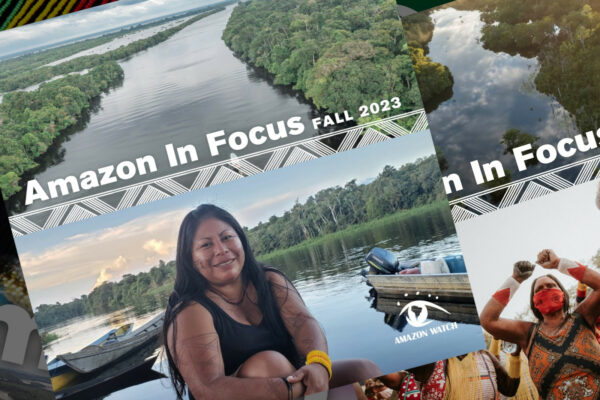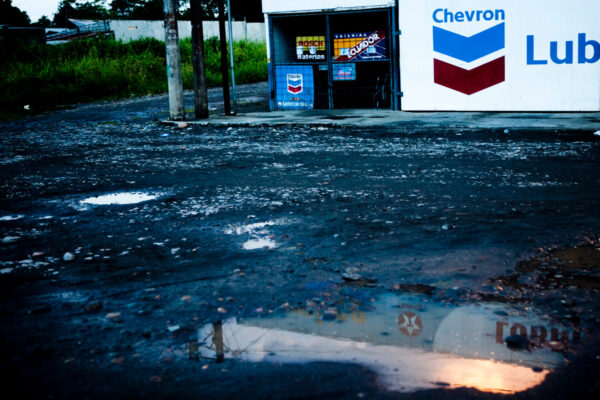Sarayaku today is a postcard-pretty rain forest village strung along the banks of the Bobonaza River, with a sandy main square on a bluff high above the waters. Children jump into the river from a high footbridge. Huge flowers grow between the oval, palm-roofed houses. Large, exotic hoatzin birds croak along the water.
A decade ago, the 1,200-resident village nearly became a battleground as Ecuadorian troops sought to impose the rights of an Argentine-US consortium to explore the area for crude oil. The Quichua community sued for damages, claiming the military illegally detained individuals in Argentine CGC’s camp and cut off transportation on the river, its dominant local transit route. The case may set a precedent far beyond the Bobonaza’s muddy shore, possibly handing indigenous communities in Ecuador and even the rest of Latin America a veto right over resource exploration and exploitation on their lands. Remediation of the potential danger stemming from remaining explosive charges in the ground also forms part of the lawsuit.
The case went to the top of the courts system in the Americas. Last Saturday, the Inter-American Court of Human Rights (IACHR) for the first time held a hearing in an indigenous community. It heard witness testimonies from local residents as the final step before issuing a ruling in the 10-year old case sometime later this year. Initially, the community questioned the government’s invitation to the IACHR as a ploy to delay a ruling. But when the day came, Sarayaku met the visit with euphoria as it became evident that the government’s strategy had backfired. Community president José Gualinga said that it confirmed a vision of “men in white who came to dispense justice.”
Hours before dawn, the Quichuas began to beat ceremonial drums. Light green palm leafs and dark red flowers adorned the route the court, represented by its president, Diego García Sayán, and judge Rhadys Abreu, walked from the Sarayaku airstrip to the main square, up a steep incline from the river. They were escorted by young men carrying chonta-wood spears and balsawood, decorated shields, dressed in dark blue shirts and black trousers, their faces freshly adorned with black markings drawn on during the night. As men and boys beat the drums, women and girls gyrated to the sound as the judges, lawyers, indigenous leaders and government representatives entered the square.
As the date of the visit neared, the government apparently realized the threat the ruling poses for its plans to extend oil exploration throughout the provinces of Pastaza, including Sarayaku, and Morona-Santiago, as well as to mining development in the Andes and remainder of the southeast. At its heart, the Sarayaku case invokes the rights of indigenous peoples over their territories, including underground resources. If Ecuador receives a harsh sentence, the domino effect on other oil and mineral exporters with significant indigenous communities including Argentina, Bolivia, Brazil, Chile, Colombia, and of course Peru could be great. President Rafael Correa might elect to hide from other summits in response, as he did from the Summit of the Americas this month (EWR611). At the same time the hearing was going on in Sarayaku, in his Saturday propaganda broadcast Correa railed against non-governmental organizations he said were behind the suit. “These little gringos with full stomachs aren’t looking for compensation for the communities, they want previous consent, which isn’t in the constitution, and (whose application) would end the democracy of the majorities to go to the democracy of a couple who with their right to veto would condemn us to misery.” This explains the high-profile appearance at the hearing by Alexis Mera, Correa’s chief legal adviser.
During the hearing he made a last-ditch effort to reach a deal out of court by recognizing state responsibility in the case of human rights violations and offering full reparations. For future development, “oil exploration that contaminates cannot be permitted,” said Mera, dressed in a white shirt, as were García Sayán and several lawyers. “If oil should ever be developed here, the best doctors could come, … and the best teachers should come from Quito,” he pledged. The government originally disputed the charges and defended the contract signed by president Lucio Gutiérrez, toppled amid street protests in 2005 and among Correa’s leading opponents.
The government position treads a thin line. Consultations of indigenous representatives will be geared towards community demands, rather than giving them a veto on oil exploration and production, as they demand. Correa this month vetoed a law containing some obligatory consultations.
The about-face of the defense illustrates the limited independence the Attorney General’s Office enjoys. Acknowledging the violations of Sarayaku residents’ rights will hand them the legal victory. Indigenous groups and non-governmental organizations that support them will feel emboldened by the ruling to continue to contest the government’s aggressive pro-oil and promining policy, irrespective of Correa’s control over the courts. After his comments before the court, Mera told reporters that the planned tender of oil exploration and production in Pastaza and the adjacent province of Morona Santiago will go ahead despite Sarayaku’s objections. On their part, community representatives voted to refuse the government’s offer before the court issues its ruling.
Oil and mining companies, meanwhile, will need to consider the ruling to adjust their community relations and understand whether contracts offered by the government might leave grounds to be challenged by communities. Close to a dozen companies have already been shortlisted for the upcoming round of tenders, dubbed “the XIth round of death” on a banner in Sarayaku.
CGC in the end gave up the field and received $20 million in compensation, contrary to Mera’s claims before the Sarayaku that the company had been “expelled.” Beyond Sarayaku, oil and other companies remain vulnerable to conflicts. Huaoranis laid off by Petroecuador a few months ago plundered a jungle tourism lodge in response. Unsurprisingly, Mera’s offer failed within minutes. Having won the case, the Sarayaku voted to wait for the courts decision before discussing any deal and vowed to continue fighting oil development.
The community, with the support of umbrella indigenous organizations, instead touts a different development model it dubs “Kawsak Sacha” (Living Forest), entailing sustainable use of the environment and autonomous administration – thus also rejecting declaring the areas national parks. Currently however, there are vast differences between the communities of different nationalities, ranging from protected areas of the Quichuas and Achuars in some communities to ranching and illegal mining.













